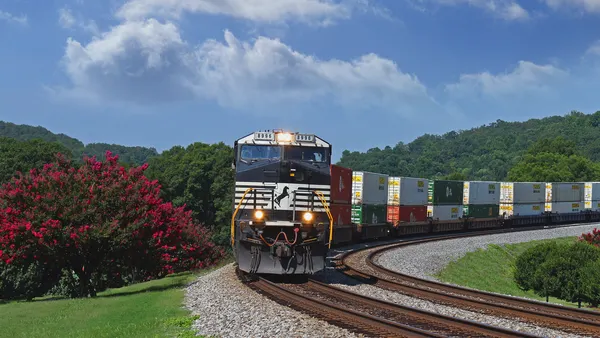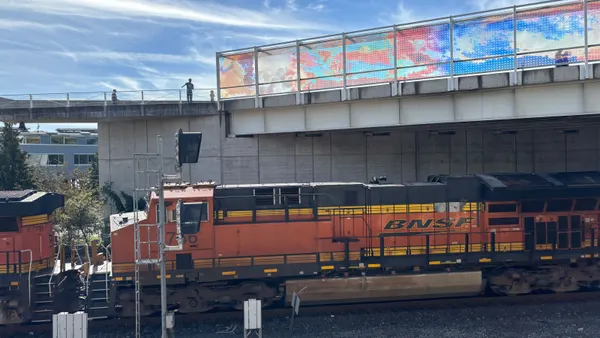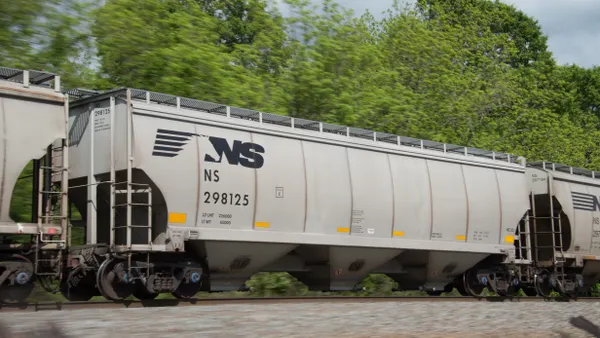Dive Brief:
- Roadrunner Transportation Systems is selling its Intermodal Services business to Universal Logistics Holdings for $51.25 million in cash, the company announced Tuesday in a press release. The company is "actively" considering other opportunities to divest its assets as it looks to simplify operations, executives said Wednesday morning on the company's third-quarter earnings call.
- The funds of the sale were used to repay leases and debt from "Roadrunner Intermodal Services and pay transaction costs, with the remaining amount available for general corporate purposes," the company said in its third quarter results released Wednesday.
- The network of 23 terminals moving freight between ports, rail ramps and shipping docks saw revenue decline 7.6% year-over-year as a result of declining volume, Roadrunner Chief Operating Officer Michael Gettle said on the company's second quarter earnings call in August. Revenue for the segment was down again in the third quarter as a result of general "market softness" and impact from Hurricane Dorian.
Dive Insight:
Declining intermodal volume was not the only hurdle Roadrunner had to overcome this quarter.
Roadrunner's largest customer is General Motors, which had a weeks long strike in September, "reduced revenue in the Active On-Demand and Truckload segments by approximately $13 million and $4 million, respectively," Roadrunner said. The company took another hit when it was on the receiving end of a malware attack in September that resulted in a $7 million impact to LTL revenue.
"We expected some bumps in the road and we certainly got them in the third quarter," Roadrunner CEO Curt Stoelting said on Wednesday's call.
The sale of the intermodal business will allow the company to focus on its "value-added logistics and asset-light LTL businesses," Stoelting said in a statement.
"The goal of this strategy is to improve our operating performance, increase our returns on invested capital, and add significant value-creation opportunities," he said.
Roadrunner's announcement comes a month after the company said it was downsizing its dry van business and laying off 450 workers. The company said it would focus on logistics and LTL segments.
Roadrunner is not the only company dealing with reduced intermodal volume. Intermodal traffic for the first nine months of 2019 is down more than 4% compared to the same period last year, according to numbers from the Association of American Railroads.
J.B. Hunt, a large player in the intermodal space, called its intermodal volume for the year flat in its third quarter earnings call last month. Terry Matthews, J.B. Hunt's president of intermodal, is confident intermodal will see growth, citing the railroad's interest in the space and the existence of millions of loads that could shift to intermodal.
"We keep on looking at a bucket of freight of 8 million to 10 million loads that we see that fit the intermodal network in North America, but yet not have converted," Matthews said on the earnings call.
The tides of the intermodal market shouldn't be a surprise to Universal Logistics Holdings, the new owner of Roadrunner's intermodal assets. Universal already operates intermodal in 40 terminals and 11 container yards across the country, according to the company's website.
This is also not the first step Universal has taken to expand its intermodal operations, which saw revenue increase 41.6% and load count increase 29.5% in the most recent quarter as a result of "acquisitions this quarter. We are very pleased with all five of our acquisitions, and they continued to perform as/or better than expected," Universal Logistics Holdings CEO Jeffrey Rogers said last month on the company's third quarter earnings call.














